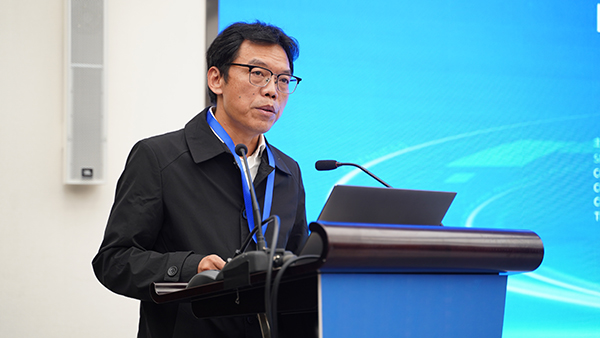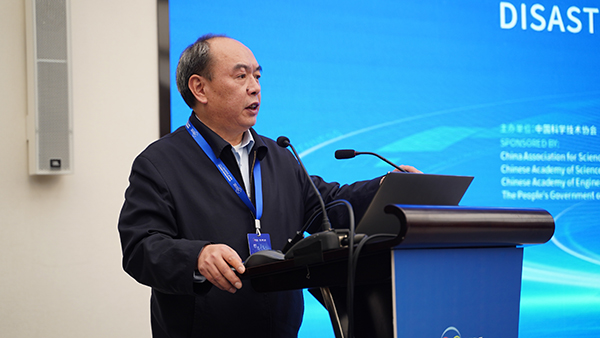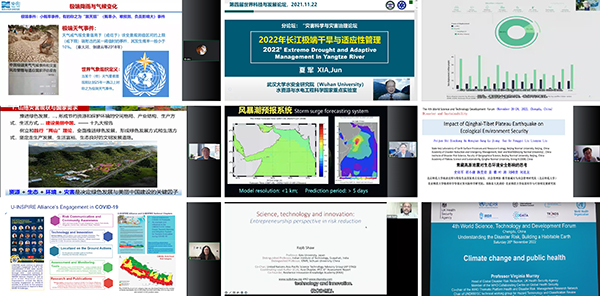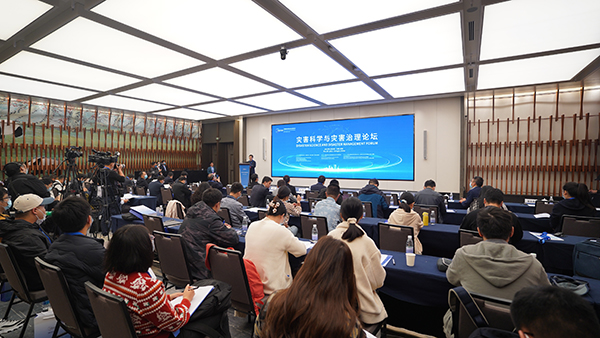The Forum on Disaster Science and Disaster Management, a sub-forum of the 4th World Science and Technology Development Forum, was successfully held in Chengdu on Nov. 26. Prof. Wang Jiatu, President of Chengdu Branch of Chinese Academy of Sciences (CAS), Mr. Chen Xuehua, Deputy Director-General of Science and Technology Department of Sichuan Province, and Prof. Wen Anbang, Director-General of Institute of Mountain Hazards and Environment (IMHE) of CAS attended the opening ceremony and delivered speeches.
Prof. Wang Jiatu introduced the science and technology work carried out by the Chinese Academy of Sciences and Chengdu Branch on natural disaster prevention and reduction, and hoped that through the forum, we can further understand disaster risks, resist disasters, strengthen disaster management and promote scientific and technological cooperation. He also said that Chengdu Branch would play a positive role in establishing innovation platforms, talent exchanges and cooperation as well as making and sharing achievements together, so as to accelerate innovative development in the field of disaster reduction around the world and form a positive interaction eventually. Mr. Chen Xuehua introduced the main efforts and achievements in Sichuan province on promoting scientific and technological innovation in disaster prevention and reduction in recent years. He hoped to deepen cooperation with international and domestic industry-university-research institutions in dealing with natural disaster risks to improve the ability and level of disaster prevention, reduction and relief. He also said that the Science and Technology Department would continue to improve its science and technology layout on disaster prevention and reduction and improve its scientific and technological innovation ability through opening up and cooperation to jointly cope with global risks and challenges. Prof. Wen Anbang introduced the basic situation of IMHE and its scientific and technological contribution in disaster prevention and reduction. He also said that IMHE will take China’s development demand as the guide, accelerate basic theory and technological innovation on disaster prevention and reduction, and explore building a new development pattern that is mutually promoted by international and domestic cycles and emphasizes collaborative innovation through comprehensive disaster reduction and high level of opening-up and collaboration, so as to guarantee safe, green and high-quality development of China’s mountainous areas.
Focusing on the risks and challenges of major natural disasters around the world, the forum has set up four thematic sections - the impact of climate change disasters and countermeasures, the physical mechanism and dynamic process of major natural disasters, natural disaster risk management, and disaster prevention and reduction and sustainable development.
Prof. Zhang Jianyun, an academician of the Chinese Academy of Engineering, analyzed the cause of flood disasters and the impact of climate change on extreme precipitation by taking the extreme rainstorm and flood in Zhengzhou on July 20, the basin flood in the Yangtze River in 2020 and the worst drought in a century in the Yangtze River in 2022 as examples. Prof. Chen Deliang, an academician of the Royal Swedish Academy of Sciences and a foreign academician of CAS, reviewed the major findings in IPCC-AR6, and proposed that optimizing climate models, analyzing the causes of climate change and predicting future trends remain major challenges for us. Prof. Xia Jun, an academician of CAS, analyzed the characteristics of the extreme drought in Yangtze River in 2022 and its major impacts and causes and suggested that we should improve the level of adaptive management for flood and drought disasters to improve the risk management system for drought relief and disaster reduction. Prof. Cui Peng, an academician of CAS, explained China’s demand to build beautiful mountainous areas, introduced the achievements on risk simulation and forecasting systems for mountain hazards, and put forward the green disaster risk reduction mode providing support for rural revitalization and the construction mode of establishing life community of mountains, rivers, forests, farmlands, lakes and grasses and its supporting technology. Prof. Lin Jian, an academician of the Academy of Europe, focused on the major marine disasters in the Indian Ocean and Pakistan coastal regions, introduced the tsunami early warning system and the high-precision tsunami early warning model, and proposed that we should strengthen international marine cooperation and develop new technologies on marine geological exploration. Prof. Shi Peijun, an academician of the International Eurasian Academy of Sciences, analyzed typical earthquake cases such as Menyuan earthquake and Maduo earthquake, clarified the impact of the earthquake on the ecological environment and proposed that we should strengthen the risk assessment and prevention of earthquake disasters on the Qinghai-Tibet Plateau. Prof. Gretchen Kalonji, the Co-Chair of the Alliance of International Science Organizations on Disaster Risk Reduction, pointed out that with the need for disaster reduction around the world, we should integrate education, research and service and focus on interdisciplinary research and education and sustainable development. She also stressed that we should strengthen international scientific and technological exchanges and cooperation, gather young talents, and promote scientific research. Prof. Rajib Shaw, the Chair of the United Nations Science Technology Advisory Group for disaster risk reduction, discussed disaster risk prevention and control from an entrepreneurship perspective, emphasized the importance of Citizen Science, and suggested that we should make innovations on research models for disaster reduction based on traditional academic research. Prof. Virginia Murray, the Head of Global Disaster Risk Reduction of UK Health Security Agency, based her opinion on the IPCC report, ten new insights on climate change and multiple reports, illustrated the relationship between climate change and public health and pointed out the urgent need to focus on ecosystem and human life and safety problems caused by more frequent extreme climate. Prof. Han Qunli, the Executive Director of the Integrated Research on Disaster Risk Programme (IRDR) co-sponsored by the United Nations Office for Disaster Risk Reduction (UNDRR) and the International Science Council (ISC), introduced the latest global disaster risk reduction research program.
Eighteen world-renowned scientists from 7 countries, including China, the United States, the United Kingdom, Sweden, the Netherlands, Japan and Pakistan, delivered theme reports in the forum, covering floods and droughts, geological hazards, earthquakes, marine disasters and cryospheric disasters. More than 400 scientific and technical workers participated in the discussion online and offline.
Prof. Cui Peng, Chairman of the forum and the academician of CAS, said that coping with natural disasters is a common challenge facing the international community and an important livelihood issue around the world. Especially in recent years, due to the impact of extreme climate, the frequency of natural disasters worldwide has increased significantly, resulting in increasingly severe impacts. He hoped that through international scientific cooperation, humans could strengthen research on the fundamental theory of Disaster Science, promote exchanges and cooperation on international disaster prevention and reduction, spread the latest understanding of disaster risk, exchange experience on disaster risk prevention, and enhance the ability to cope with natural disasters, to build a safe, resilient, green and sustainable “habitable earth” as well as “a community with a shared future for mankind.”
The 4th World Science and Technology Development Forum was jointly hosted by the China Association for Science and Technology, the Chinese Academy of Sciences, the Chinese Academy of Engineering and the People’s Government of Sichuan Province and organized by Chengdu Municipal People’s Government. Before this, the World Science and Technology Development Forum has been successfully held in Beijing for three consecutive sessions. This forum, organized by local government for the first time, carries on the theme of “Openness, Trust and Cooperation”, and has set up the main forum, the World Digital Economy Forum and 16 sub-forums. The Forum on Disaster Science and Disaster Management was jointly organized by the Institute of Mountain Hazards and Environment of CAS, the China-Pakistan Joint Research Center on Earth Sciences, and the Alliance of International Science Organizations on Disaster Risk Reduction. Centering around the theme of “understanding disaster risks, building a habitable earth”, it is aimed to accelerate basic research on Disaster Science, promote scientific and technological collaboration on global disaster prevention and reduction, effectively cope with natural disaster risks, and create a safe, green and resilient living environment.

Prof. Wang Jiatu delivered a speech

Deputy Director-General Chen Xuehua delivered a speech

Director Wen Anbang delivered a speech

Specially invited experts delivered reports

Site of the forum
